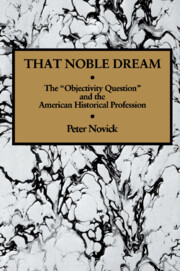Book contents
- Frontmatter
- Contents
- Preface
- Introduction: Nailing jelly to the wall
- I Objectivity enthroned
- II Objectivity besieged
- 5 Historians on the home front
- 6 A changed climate
- 7 Professionalism stalled
- 8 Divergence and dissent
- 9 The battle joined
- III Objectivity reconstructed
- IV Objectivity in crisis
- Appendix: Manuscript collections cited
- Index
5 - Historians on the home front
Published online by Cambridge University Press: 29 March 2011
- Frontmatter
- Contents
- Preface
- Introduction: Nailing jelly to the wall
- I Objectivity enthroned
- II Objectivity besieged
- 5 Historians on the home front
- 6 A changed climate
- 7 Professionalism stalled
- 8 Divergence and dissent
- 9 The battle joined
- III Objectivity reconstructed
- IV Objectivity in crisis
- Appendix: Manuscript collections cited
- Index
Summary
In both European and American historiography there has been a tendency, over the last generation, to question the earlier view of World War I as a great watershed in intellectual history, and to point out that many important postwar currents had not only their roots but their first flowering in the decades before 1914. No doubt this is true, particularly for the study of the literary and artistic avant-garde, and for work on the cutting edge of philosophy and science as well. Even in the case of historians, a case could be made, as suggested in Chapter 4, for locating a turning point around 1910, rather than in 1914—18. However, concerning the “objectivity question,” the dissident currents which emerged within the historical profession in the years just before the war were limited and hesitant. There was no change in the orientation of even a substantial minority before the interwar years. And, for a number of reasons, the war seems to me a more appropriate point to begin the discussion of that change—a change usually discussed with reference to the explicit “relativist” theses of Carl Becker and Charles Beard, but which, as we shall see, was a considerably more widespread, albeit minority, phenomenon.
The war posed a fundamental and sweeping challenge to the profession's posture of disinterested objectivity; to its pride in the distinction between the tendentious, superpatriotic, and propagandistic historical writing of benighted amateurs, and the austere detachment and evenhandedness of the professional.
- Type
- Chapter
- Information
- That Noble DreamThe 'Objectivity Question' and the American Historical Profession, pp. 111 - 132Publisher: Cambridge University PressPrint publication year: 1988

